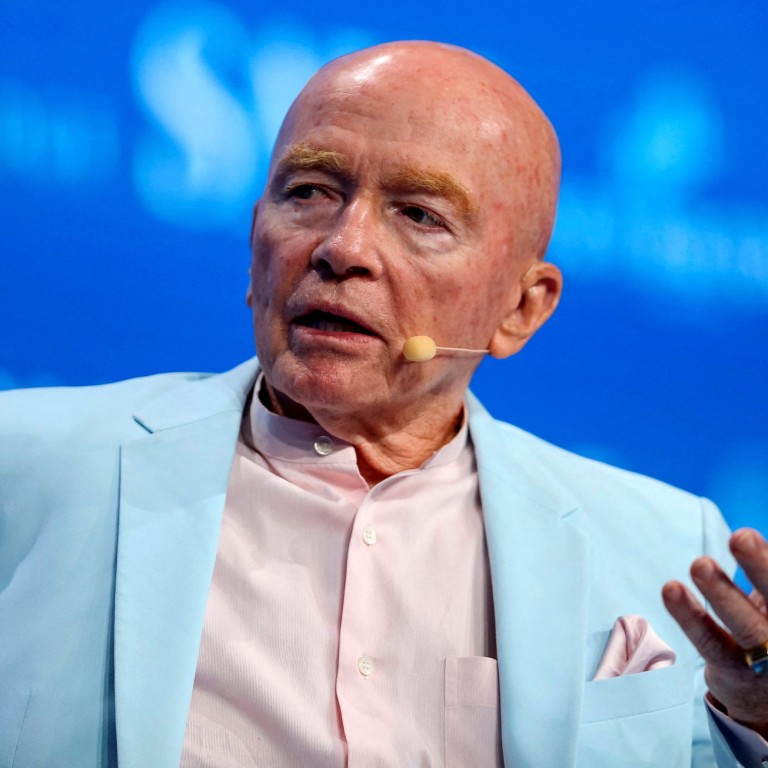
Exclusive | Mark Mobius still keen on investing in China after recent hiccup, but wants Beijing to relax capital controls
- ‘My view on China has not changed and we are still looking at investment opportunities,’ Mobius says
- The veteran emerging markets investor believes the current banking crisis in the US and Europe will not morph into global crisis and is unlikely to impact China
China’s economy and stock markets are expected to see strong growth this year because of the impetus provided by the border reopening and government policies, according to investment guru Mark Mobius.
Mobius, who had earlier expressed concerns about China’s capital controls, said he was positive on the country, but believed that the country would be more attractive to foreign investors if Beijing relaxes its control on capital flows.
“My view on China has not changed,” he told the Post in an interview. “We are still looking at investment opportunities in China. I’m still positive about investing in China, Hong Kong and Taiwan.”

“The Chinese government is taking measures to revitalise the economy,” Mobius said, adding “it is a very good sign” that Beijing is committed to supporting private enterprise.
“The important thing is for the government to allow private enterprises to work without too much regulation. Because at the end of the day, it is a free-market economy that will really drive growth.”
‘I can’t get my money out’ of China: billionaire investor Mark Mobius
Mobius, dubbed the “father of emerging markets” for his more than 30 years of experience investing in emerging markets, surprised the market in an interview with Fox Business earlier this month, when he warned investors to be careful with their investments in China as he could not get his money out of the country.
Mobius agreed the issue was not related to any policy change in China, but because of the restrictive documentation requirements under the current control rules.
Mobius said he had sold a flat in Shanghai 18 years ago and deposited the money at a Shanghai branch of HSBC. When he recently asked the bank to transfer the money from Shanghai to an account with the bank in Hong Kong, he was asked to submit a lot of documents related to the sale and taxation records among others.
“Capital controls in China prevent individuals from getting money out if you don’t have the proper documentation. It was the documentation issue that resulted in me not being able to get my money out earlier,” he said, adding that the issue has now been resolved.
‘Hong Kong back in business’, Standard Chartered chair Jose Vinals says
Still, he believes removing capital outflow restrictions would benefit China’s economy.
“If you had money in America and you wanted to get it out, you don’t have to produce that kind of documentation. If China would relax its capital controls, it would be an even more attractive market to international investors.”
Mobius, who has not travelled to China since the pandemic, plans to visit the mainland and Hong Kong in the summer.
Mobius, who turns 87 in August, said the recent banking crisis in the US and Europe would not develop into a global financial crisis like the one in 2008, as central banks have reacted quickly enough to contain the risks and prevented it from spreading around the world.
“It is not going to affect China. The Credit Suisse thing is really a European-centred problem. Of course, there is some concern about banks in general wherever they may be, but this is not going to affect China that much,” Mobius said.
2023 will not turn into a repeat of 2008 crisis, Hong Kong SFC says
“In the US, the central bank moved very quickly to reassure depositors of the banks that were in trouble. The fact that there are so many depositors involved means that the government has got to come to the rescue, otherwise, all confidence in the banking system will be lost.”
Mobius’ positive view on China is shared by other analysts.
“The outperformance of the Chinese economy in the months ahead due to the reopening should provide a window of opportunity for both Chinese and Asian companies that are less dependent on exports,” said Tai Hui, APAC chief market strategist at JP Morgan Asset Management.
“We also expect the US dollar to weaken, and this should benefit Asian and emerging market assets.”

